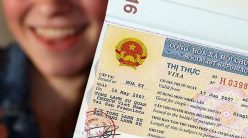The first instance court rejected the carrier’s request, arguing that the customer is the vulnerable party protected when the agreement between the two parties is unclear.
On August 15, the People’s Court of Ho Chi Minh City held an appellate hearing of the Vietnam Posts and Telecommunications Group (hereinafter referred to as the group) suing Ms. Sy Truyen Hoang Ngan for more than 1 billion dong of phone charges. Due to the complexity of the case, the jury decided to defer the sentence until August 21 to pronounce the sentence.

Image for illustration purposes only (Internet source)
Six days, phone charges more than 1 billion VND
According to the dossier, in July 2013, Ms. Ngan signed a contract to provide and use post and telecommunications services. Accordingly, the group provided her with a postpaid SIM card with the last three digits of 524. In addition to domestic calls, Ms. Ngan was also allowed to call international roaming for other phones, not limited by location. Caller location, call receiver location, phone type. Ms. Ngan pays a deposit of 5 million dong, if she doesn’t use the service, she will get this money back.
After that, the group discovered that Ms. Ngan’s phone number from July 1 to 6, 2013 (six days) had used the international roaming service, causing a charge of more than 1 billion dong. The group stopped providing the service and announced a request to pay the fee, but Ms. Ngan disagreed, so she filed a lawsuit. Plaintiff provided the court with a detailed 100-page fee schedule.
Ms. Ngan admitted that she signed a service contract as above. However, she only registers to use international roaming services in case subscribers are abroad. But the contract does not have an agreement on international calling that is not limited by the location of the caller and receiver. The transaction staff explained about the deposit amount of 5 million VND that if the fee exceeds this amount, the call will be blocked. In the contract, the teller added the word “threshold 500” and explained that the threshold for domestic calls per month was no more than 500,000 VND.
During the court’s testimony, Ms. Ngan said that she once let an acquaintance of Pakistani nationality use this phone SIM. After that, she could not contact this person and did not know where this person was, so she filed a complaint asking the police for clarification.
Unknown contract, carrier bears
In September 2014, the District 11 People’s Court heard the first instance that according to Ms. Ngan’s testimony, the case had signs of a criminal offence. But on the day of trial, Ms. Ngan could not provide evidence to prove that the case was prosecuted. While the relationship between the group and Ms. Ngan is a civil contract dispute, the court accepts and settles it. If there is a real crime, the offenders will be considered later in accordance with the general regulations.
According to the court, the signed contract had unclear contents, the parties could not agree on the interpretation of the contract, there was no evidence to prove that the plaintiff had clearly explained to the defendant the contents of the contract. contract abbreviation. Accordingly, in the event that the dominant party introduces content that is detrimental to the disadvantaged party, the contract interpretation must be in favor of the disadvantaged party. Clause 2, Article 407 of the Civil Code also stipulates that if a model contract contains an unclear provision, the party offering the contract must bear a disadvantage when interpreting that provision.
According to the court, the group’s side was determined to be the strong side, and Ms. Ngan was the weak side. Because the plaintiff is naturally more knowledgeable than Ms. Ngan on issues related to the signing and use of telecommunications services. The contract was also drafted by the plaintiff, so the contract must be interpreted in favor of Ms. Ngan.
The Group believes that when signing the contract, there is no limit on international call charges and international roaming calls. The amount of 5 million dong is a deposit, when the contract is terminated, it will be returned to Ms. Ngan, which is inconsistent in relation to other provisions agreed by both parties. Because when agreeing on the threshold to charge domestic calling charges of 500,000 VND without specifying the maximum charge threshold for international calls, there is a contradiction, not in accordance with the common law. Because the risk of generating too much international freight that the subscriber cannot pay is always higher than the domestic one.
Dismiss the lawsuit
The group also explained that in the contract, the teller had handwritten “RM” and in the receipt had the word “open RM” which meant that Ngan registered to use the roaming service and was called to roam internationally. world without being limited by the location of the caller, the location of the receiver, the type of the receiver. This interpretation is not appropriate. Because in the field of telecommunications, the term roaming is understood in the most general sense to refer to the extension of the connection service area where it was not originally registered. This roaming occurs when a subscriber of one service provider uses another service provider’s infrastructure to support the subscriber of his service.
When registering for roaming, subscribers can make calls in an area that has no signal of the carrier they have registered because the call will be connected through the use of another carrier’s signal. Therefore, Ms. Ngan said that when she signed the contract, she only registered to use the international calling service when she went abroad, which was consistent with the meaning of the term roaming. The contract does not explain the term roaming, but the corporation relies on the abbreviation “RM” for the above explanation to be unfounded.
Besides, the content of the fee calculation table that the corporation submitted to the court does not guarantee objectivity. Specifically, on 5-7-2013, in a period of 38 minutes and 13 seconds, Ngan’s subscriber number made 23 calls to the Maldives, but the group charged and asked to pay the fee with a duration of 16,099 seconds (more than 16,099 seconds). four o’clock).
In court, the group explained that the charge of VND 987 million was a call forwarding fee, not an international call fee. However, the plaintiff could not provide the phone numbers that called 524 to perform the call transfer service. Thus, when the Roaming service charge exceeds the threshold of VND 5 million but the corporation does not block the call, it is at fault. Since then, the court has rejected the entire petition, so the group appealed.
Source: According to plo.vn
For support and advice on Business, Investment, Intellectual Property, etc., in the best way, please contact us with the following information:
DHP LAW
Address: L4- 09.OT06 Landmark 4 Building Vinhomes Central Park, 720A Dien Bien Phu, Ward 22, Binh Thanh District, Ho Chi Minh City









